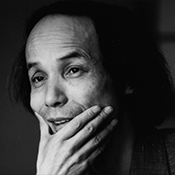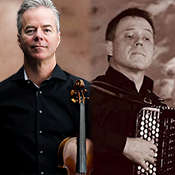
Composer Eric Nathan: Bach, Interpretation, and New Beginnings
David Lewellen
PUBLISHED
Tagged Under: 2020.21 Season, Conversations with Composers
Milwaukee audiences will get an introduction to the music of Eric Nathan this week, six months after the original plan.
Nathan, a composer in his 30s, who teaches at Brown University, was commissioned to write a world premiere for the opening of the Bradley Symphony Center last October, but the pandemic upended those plans. Although that piece for full orchestra will be performed when the hall opens in the fall, his chamber-sized work Dancing with J.S. Bach II will make up part of Saturday’s program, which is available for single-concert stream on MSO Live.
The piece is actually an orchestration of five separate keyboard movements by Bach, and Nathan “made a conscious decision not to do what some other composers have done, refracting the older music in my own language. My voice comes through subtly.” He added some lines of counterpoint to fill out the texture, and Bach’s scores contain very few indications of tempo or dynamics, but Nathan fills in lots of instructions to the performers. A solo pianist, he said, “brings a whole range of meaning to music to help it speak,” like an actor. “My goal was to hear these works in orchestration like a pianist.”
But, he acknowledges, performers bring their own interpretations to the music, too. “I learn from how performers interpret my music,” he said. “And I’m pleased to let them convince me. Sometimes it’s not till after the performance that I go home and realize that it’s a new way of seeing my music, and maybe better than what I had thought of.”
The Bach suite is scored for strings and solo oboe, which will be performed on Saturday by MSO principal oboist Katherine Young Steele. Adding the oboe part was the “greatest composition lesson I could have gotten from Bach, to see how I could convey his musical intent but also find other ways of finding meaning in it,” Nathan said. “It kind of turned into an oboe concerto, which wasn’t necessarily the intent, but it was a quality that was already there in the music.”
In general, Nathan is a composer who is keenly aware of what has come before him. “When I’m writing a piece, my office looks like a historian’s office in the middle of writing a book,” Nathan said. “I’ll have scores lying around and Spotify playlists cued up to see how other composers approached the same challenges.”
In the case of “Opening,” the eight-minute piece he wrote with the intention of inaugurating the Bradley Symphony Center, Nathan toured the construction site in January 2020, when it was full of scaffolding. But when the pandemic hit in March, “it was hard to find anything to celebrate,” he remembers. “This work was also a journey for me. It’s the opening of the concert hall, but it’s also our own souls and hearts and the life we missed and how we were changed by the experience. I don’t know how people will feel when they first walk into hall. They might be ready for celebration right off the bat, but I also wanted to give the audience time to reflect and think as a community.”
The piece is inspired by the particular layout of the concert hall, with directions to place solo string and woodwind players in various spots on the main floor and balcony. But of course, Nathan hopes that other orchestras will perform it in other halls. “The longer I go after a premiere, the less the importance of the inspiration seems,” he said. “It’s a lens that helped me figure out choices and ideas, but it exists on its own. If the hall has two balconies, or none, the goal is for it to work in any space.”
“Eric is one of the great composers of the next generation,” said MSO Music Director Ken-David Masur, who commissioned the Bach piece for the Chelsea Music Festival in 2018. “He has a knowledge of the past and he can write in many different styles, but he also can be poignant for the moment that we’re in.”
Nathan’s piece on Saturday’s program will be one of several by different composers who were inspired by Bach in different ways. “Generations of composers have done their own take on Bach,” Masur said, “and he saw this as an opportunity. We treat it like a Baroque piece, but Eric is also looking forward.”
When “Opening” premieres in the fall, Nathan plans to come to Milwaukee for the occasion. “It helped me keep going at the beginning of the pandemic, and it would be cathartic to experience it,” he said. “I couldn’t just crawl into a hole at home. It made me consciously think toward a future we could all hope for.”



